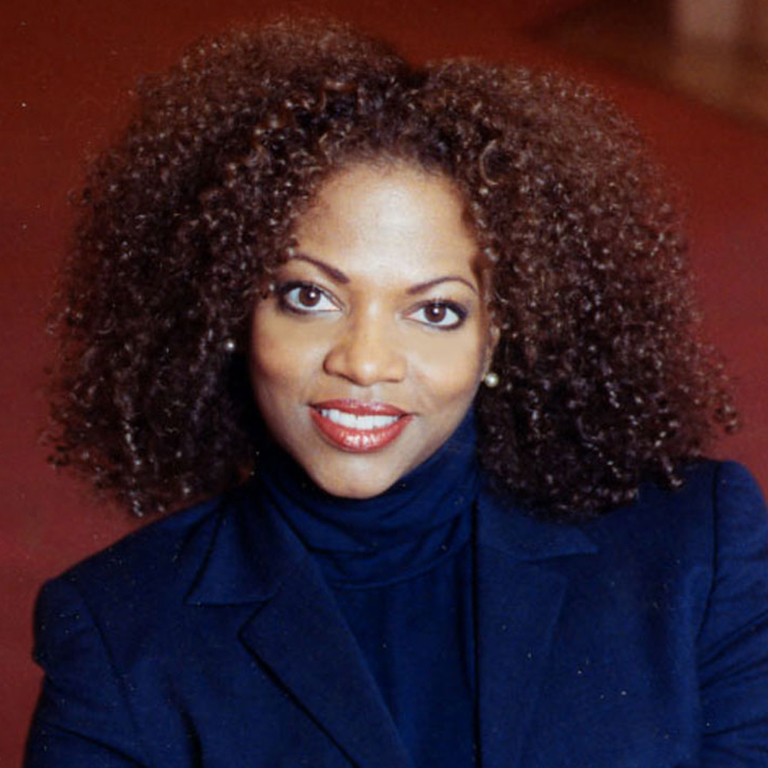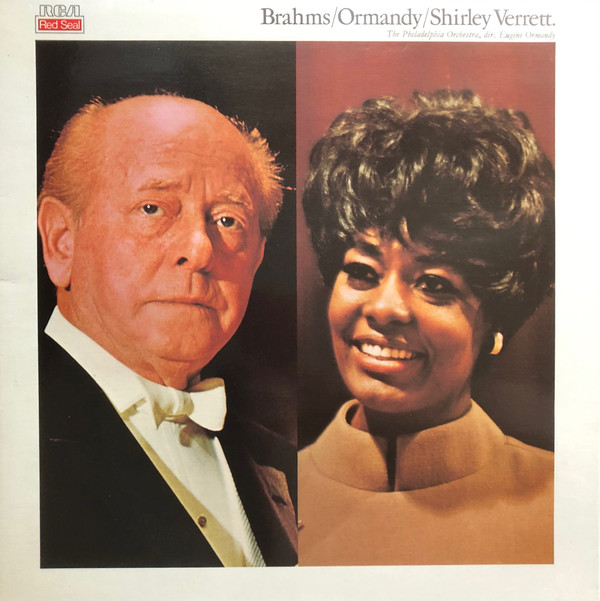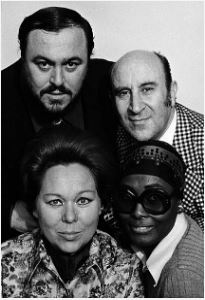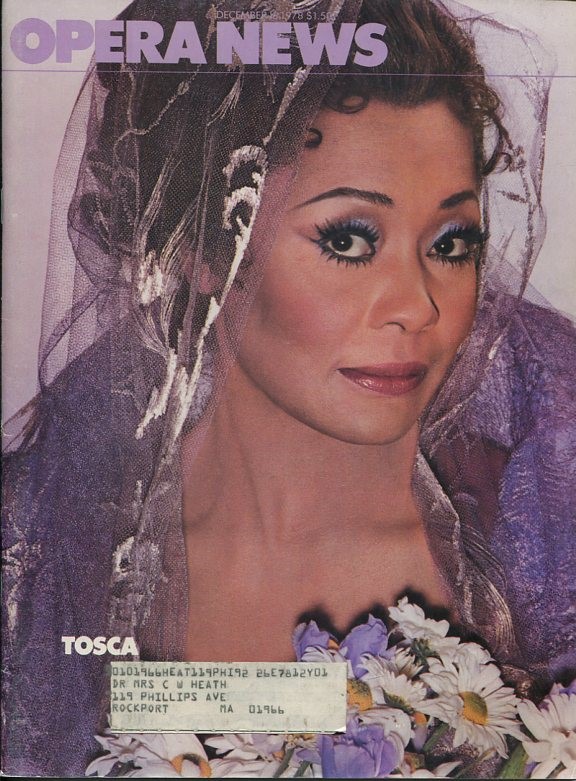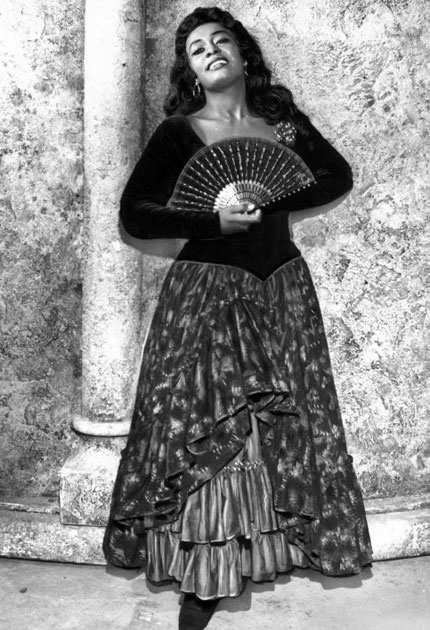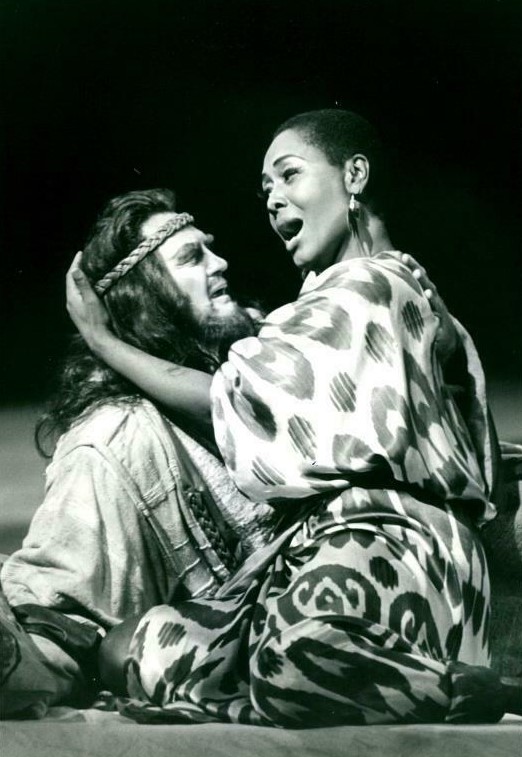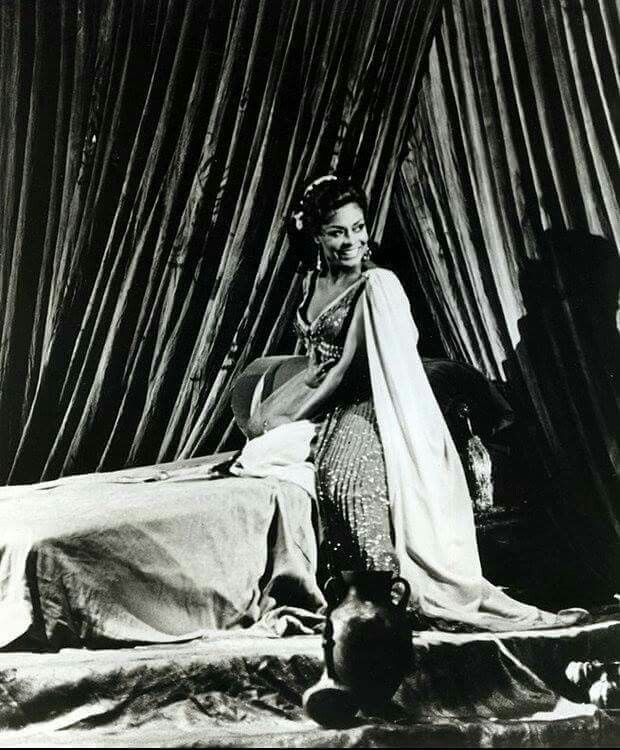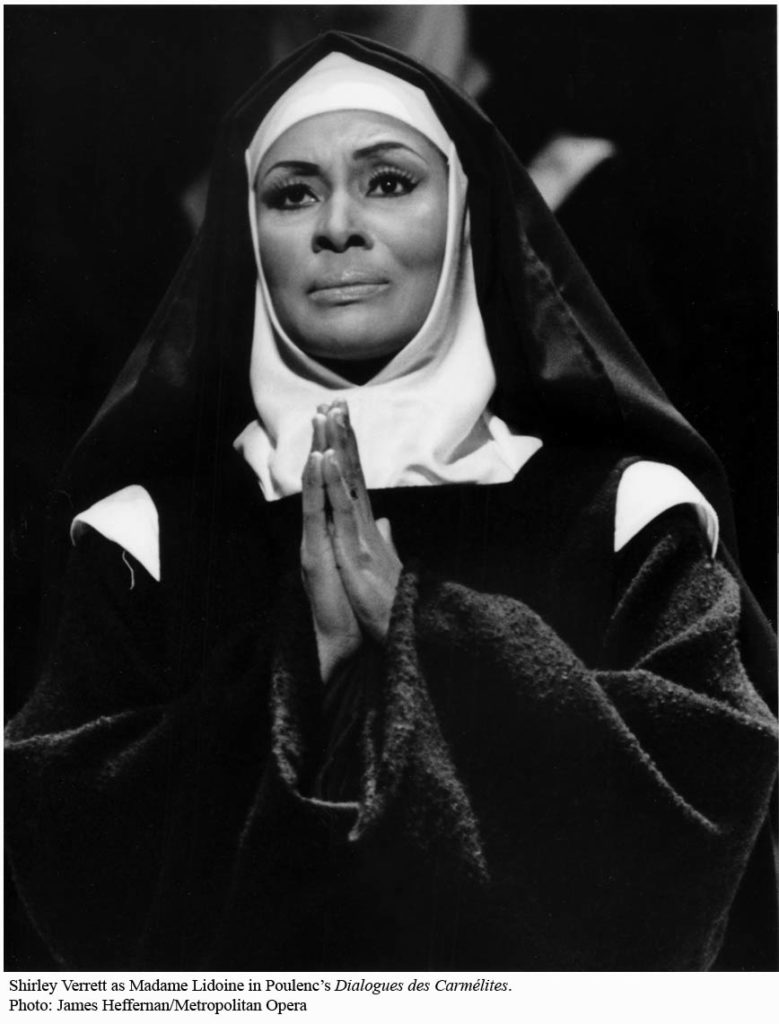Episode 5: Shirley Verrett I: La Nera Callas – Falcon or Verdi soprano?
SOCIAL SHARE
SUBSCRIPTION PLATFORM

This episode is the first of two on one of my favorite singers, the Zwischenfachsängerin Shirley Verrett. Renowned in the United States for her performances of Verdi mezzo-soprano parts, particularly Azucena in Il Trovatore and Eboli in Don Carlo, the late singer commanded an enormous repertoire, comprising bel canto and French roles, on which she left her indelible stamp. I focus in particular on the French roles she performed at the Opéra de Paris from the mid-1980s through the early 1990s, as well as her Verdi soprano roles, including Amelia in Un ballo in maschera and the title role in Aida. Known in the Italian press as La Nera Callas [The Black Callas], Verrett is heard in this episode singing Brahms, Gluck, Saint-Saëns, and Verdi roles for both soprano and mezzo-soprano. Special attention is paid to her newsworthy appearances with fellow African American mezzo-cum-soprano, Grace Bumbry, the first of which, a joint Carnegie Hall concert in 1982, honored the iconic contralto Marian Anderson on the occasion of her 80th birthday.
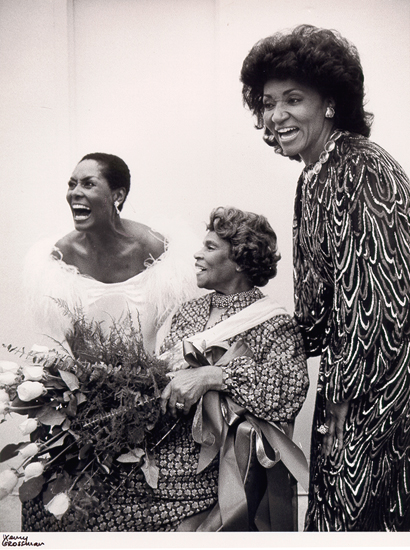
great singers and important icons all! Photo by Henry Grossman.
RECORDINGS FEATURED ON THIS EPISODE
Brahms: Alto Rhapsody. Shirley Verrett, Eugene Ormandy conducting the Philadelphia Orchestra and the Men of the Temple University Chorus, Robert Page, conductor. Recorded 1969. RCA Victor, ARL1-3001 (Released 1978).
Though this recording was first released in 1978, at which time Shirley Verrett had expanded her repertoire to include significant soprano roles, it was made in 1969. Verrett had a long-standing relationship with the Philadelphia Orchestra, beginning in 1960, when Leopold Stokowski hired her to sing the solos in Manuel de Falla’s El amor brujo. Stokowski had earlier hoped to hire her to sing the role of the Waldtaube in Schoenberg’s Gurre-Lieder with the Houston Symphony, but the board of the symphony refused to let her appear because she was black. At any rate, Verrett is heard here in her absolute mezzo prime. It is particularly moving to hear her singing this part with this conductor and this orchestra, since in 1939 Ormandy and his Philadelphians made an iconic recording of the same piece with the distinguished contralto Marian Anderson that is even more beautiful than her later 1951 recording with Fritz Reiner. Verrett’s collaborations with Ormandy and the Philadelphia Orchestra include a recording of Mendelssohn’s Elijah released in 1970 with the Welsh tenor Richard Lewis and the Finnish bass-baritone Tom Krause (two particular favorites of mine) and a 1975 concert with Luciano Pavarotti in celebration of the 118th anniversary of the Philadelphia Academy of Music.
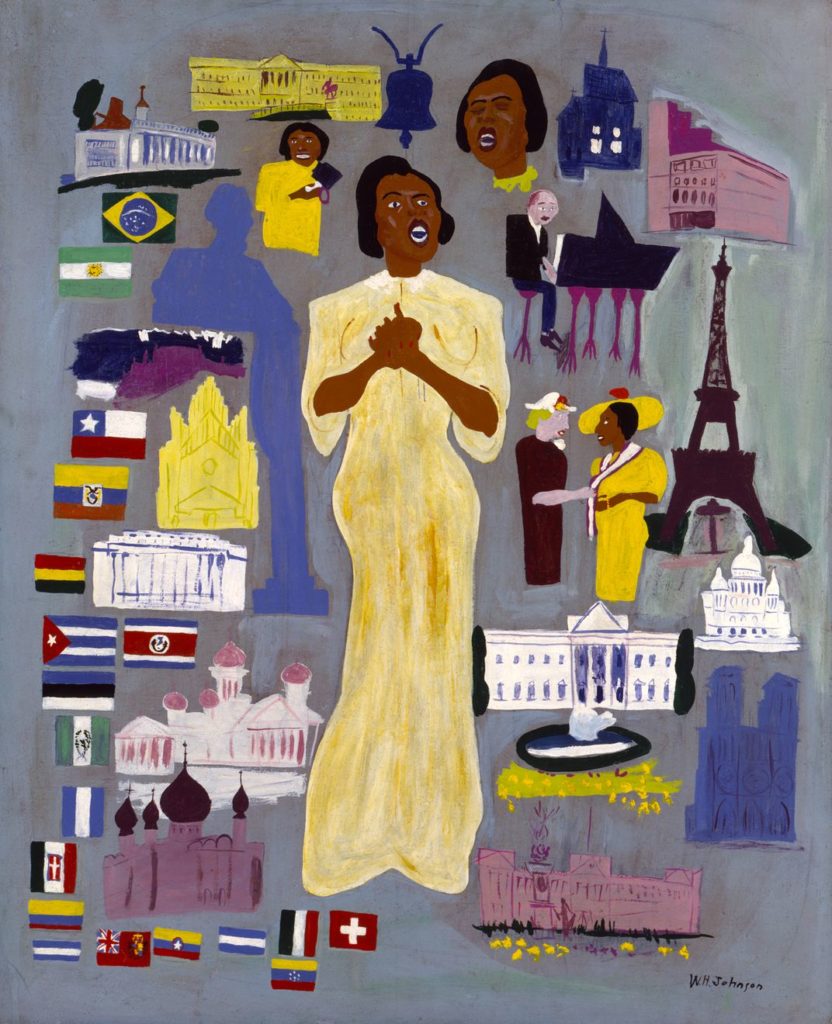
of the great contralto and civil rights icon Marian Anderson
Verdi: O don fatale (Don Carlo). Two live recordings. The first is from the Wiener Staatsoper 25 October 1970. Horst Stein conducting the Orchestra of the Wiener Staatsoper. The cast includes Corelli, Janowitz, Ghiaurov, Waechter, Talvela, and Blegen. The second is Shirley Verrett’s final Eboli at the Metropolitan Opera, 12 April 1986. David Stivender conducted a cast which included Giuliano Ciannella, Aprile Millo, Leo Nucci, James Morris, Dimitri Kavrakos, and Hei-Kyung Hong. It is interesting to contrast Verrett’s two performances nearly 16 years apart. In both versions she brings her characteristic full-throated intensity. Though by 1986 the voice has lost a certain amount of its plushness, she sounds for the most part at the age of 55 very much still in control of her instrument. As for the earlier performance, I am going to go out on a limb and make the unprovable statement that it is simply the greatest performance of this aria that has ever taken place in the history of the universe.
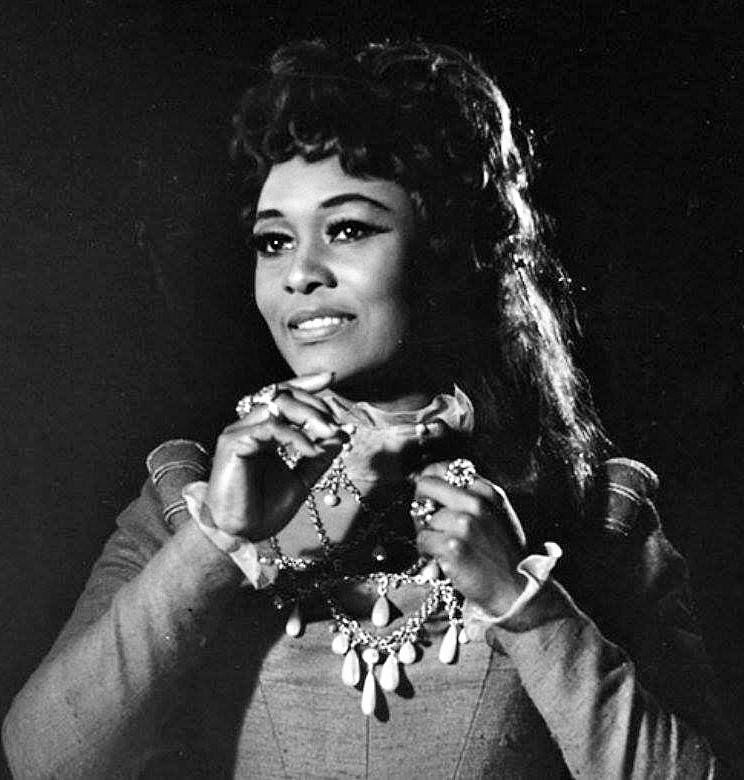
Verdi: Deh, rallentate, o barbari (Il Trovatore). Live performance from the Metropolitan Opera, 1976. Gianandrea Gavazzeni conducted the Metropolitan Opera Orchestra and Chorus in a performance the cast of which included Renata Scotto, Luciano Pavarotti, and Louis Quilico. It still boggles my mind that this video footage, however grainy, actually exists. Someone must have smuggled a video camera into the house and furtively recorded these excerpts (there are several other clips from this performance that are also available on YouTube). Though the other principals as heard here are also in fine form, it is Verrett’s Azucena that blazes forth with particular intensity. (BTW, dig her frames on the photo at left!)
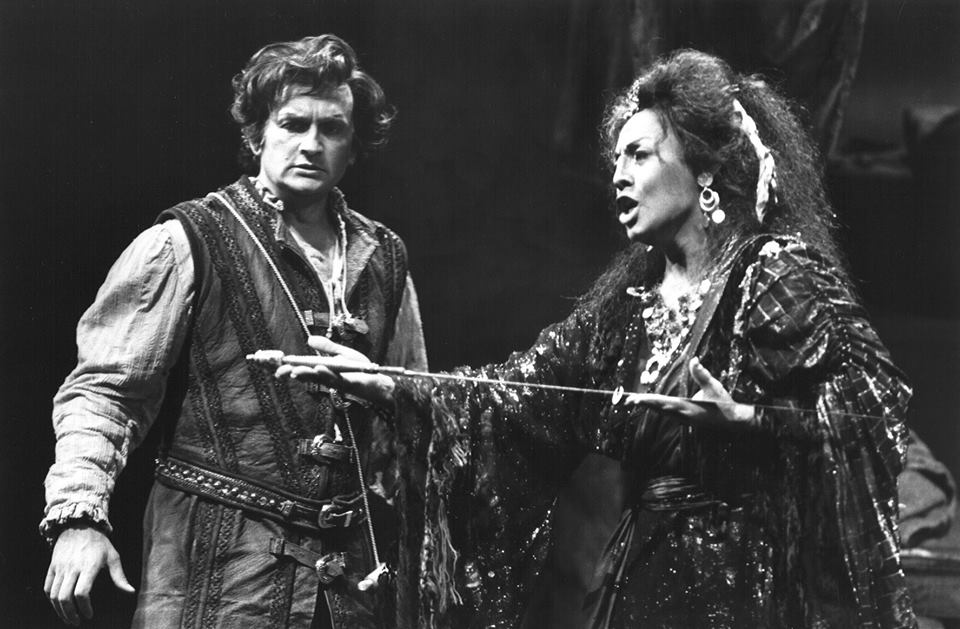
in the Lyric Opera of Chicago production of Il Trovatore, 1987,
Verdi: Ecco l’orrido campo (Un ballo in maschera). Live 1977 performance from La Scala with Claudio Abbado conducting. The cast included Luciano Pavarotti, Piero Cappuccilli, Elena Obraztsova, and Daniela Mazzucato. As noted on the podcast, Verrett’s performance here was not considered a success. Perhaps it lacked the iconic quality of her appearances as Lady Macbeth at La Scala the previous season, but on its own terms, and based on what one hears in this recording, she proves herself a full-fledged Verdi soprano. For those interested, the complete recording is available for purchase here at a reasonable price. (Incidentally, by the time the opera was filmed for television the following season, Verrett had already been replaced by Mara Zampieri as Amelia, a singer I honestly have never “gotten.”)
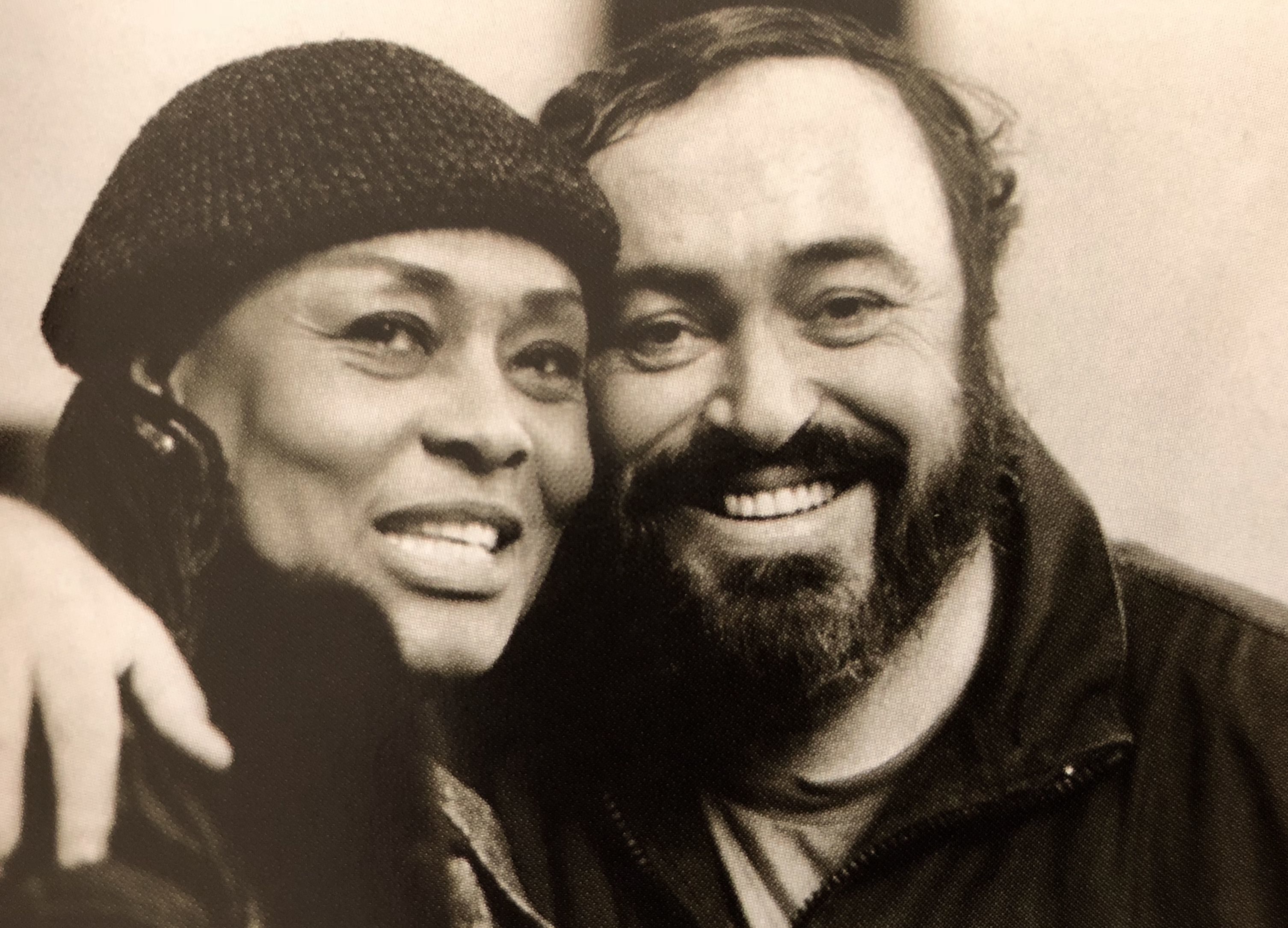
Pavarotti and Verrett shared numerous memorable performances together including not only this Ballo, but also, at the Met, Tosca and La Favorita, as well as the late career 1990 recording of Trovatore (released in 1995) in which Verrett’s Azucena commands particular attention.
Puccini: Vissi d’arte (Tosca). Live performance from Tanglewood, 31 July 1980. Seiji Ozawa conducts the Boston Symphony Orchestra. Cast includes Veriano Luchetti, Sherrill Milnes, Italo Tajo, and Kim Scown. People love to take pot shots at Verrett’s assumption of the role of Floria Tosca. I don’t get what the criticism is all about. I think it suits her down to a T. I know that she was having a particularly hard time with her allergies around the time she was first singing the role at the Met (a friend of mine recalled seeing her in his ENT’s office apparently in a compromised state), but I find her performance there (and here, in the Tanglewood performance) thrilling. For one thing, her high notes sail forth with ease and assurance and in her Vissi d’arte in particular, she sings with an ideal sense of line, shape, and feeling. It is also not insignificant that she does not for once turn the aria into a dirge (don’t get me started on this!)
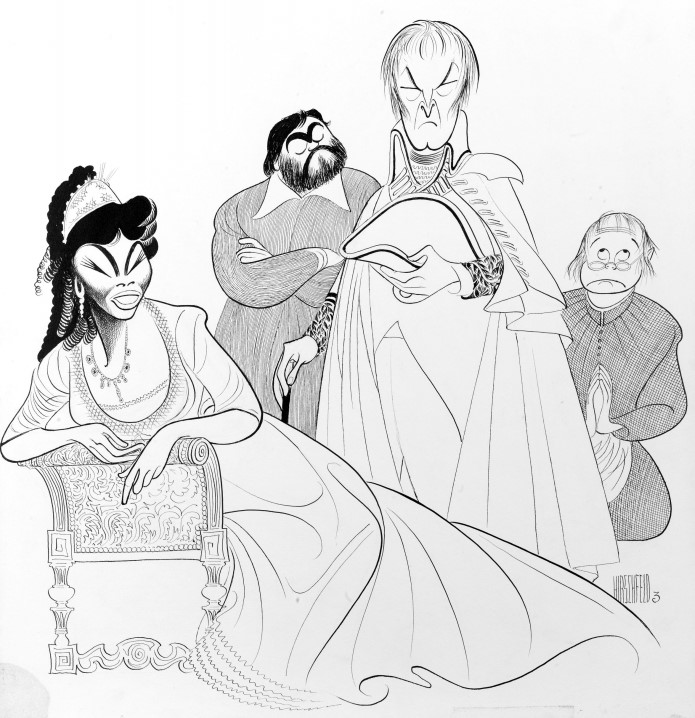
(Shirley Verrett, Luciano Pavarotti, Cornell MacNeil, Italo Tajo)
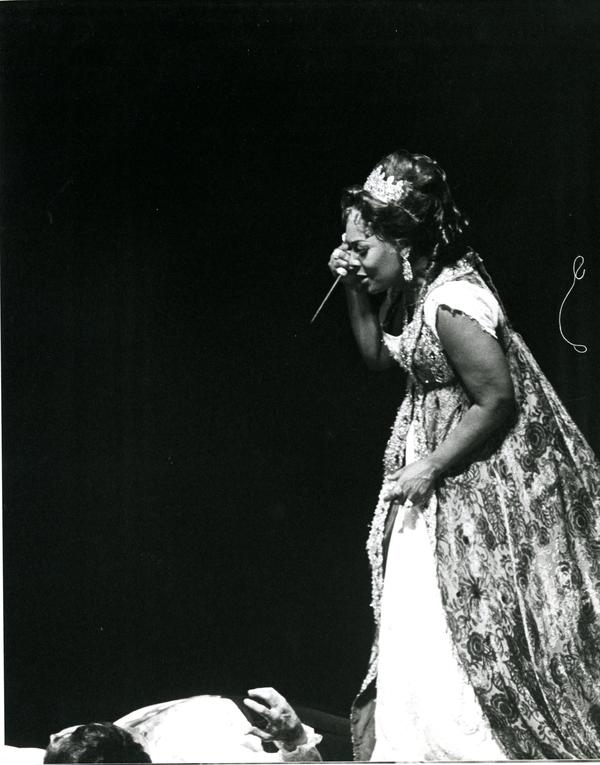
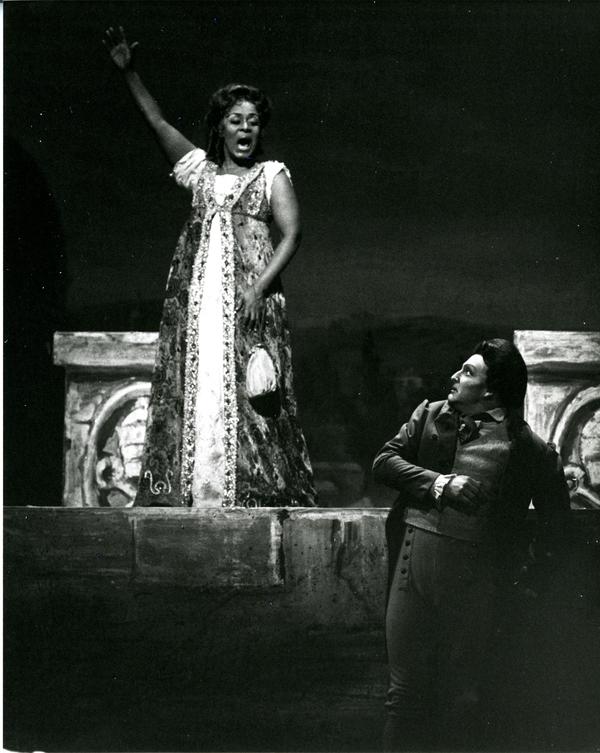
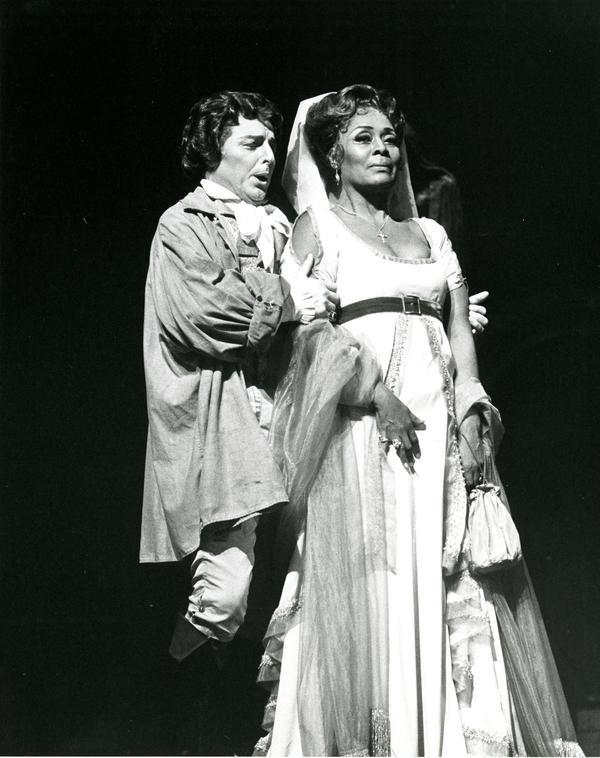
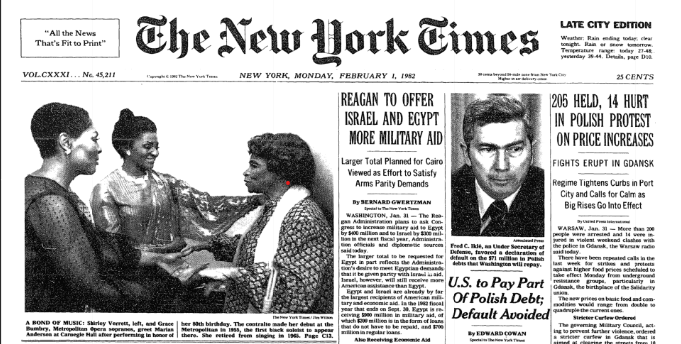
Rehearsal and interview with Shirley Verrett and Grace Bumbry (if I am not mistaken, that is Warren Wilson at the piano). This is one of my favorite YouTube clips of all time. Everything about it is perfection: the singing, the slightly barbed camaraderie, the scarf magic. I believe this clip is from the televised appearance of the two divas at Covent Garden in 1984. (For more, see directly below.)
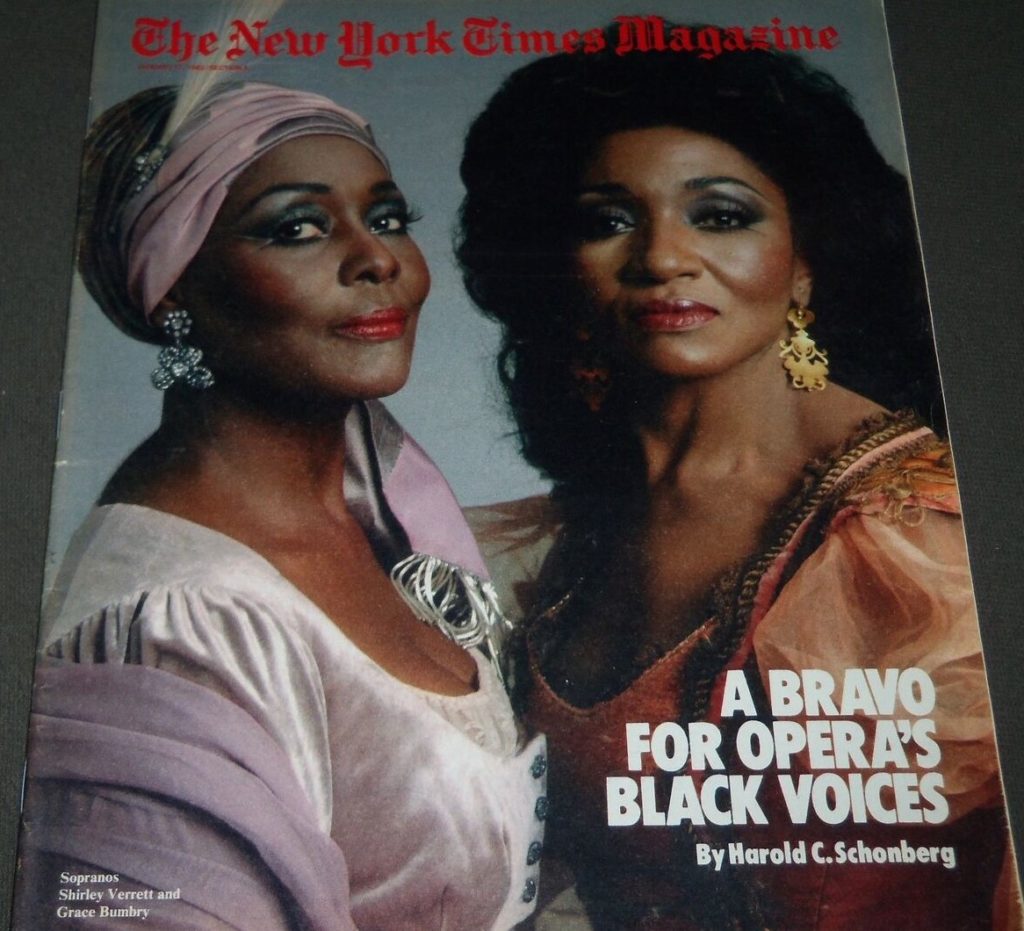
Marian Anderson’s 80th [sic] birthday generated enormous publicity,
including a New York Times Magazine cover story.
Verdi: Fu la sorte dell’armi (Aida). Shirley Verrett (Aida) and Grace Bumbry (Amneris) in a 1984 PBS telecast from Covent Garden recorded live on 4 December 1983 with Michelangelo Veltri conducting. Neither diva, in my opinion, has ever sounded better. An absolutely stunning performance that desperately needs to be issued on DVD. Take note of what the Christian Science Monitor critic Arthur Unger has to say about this performance.
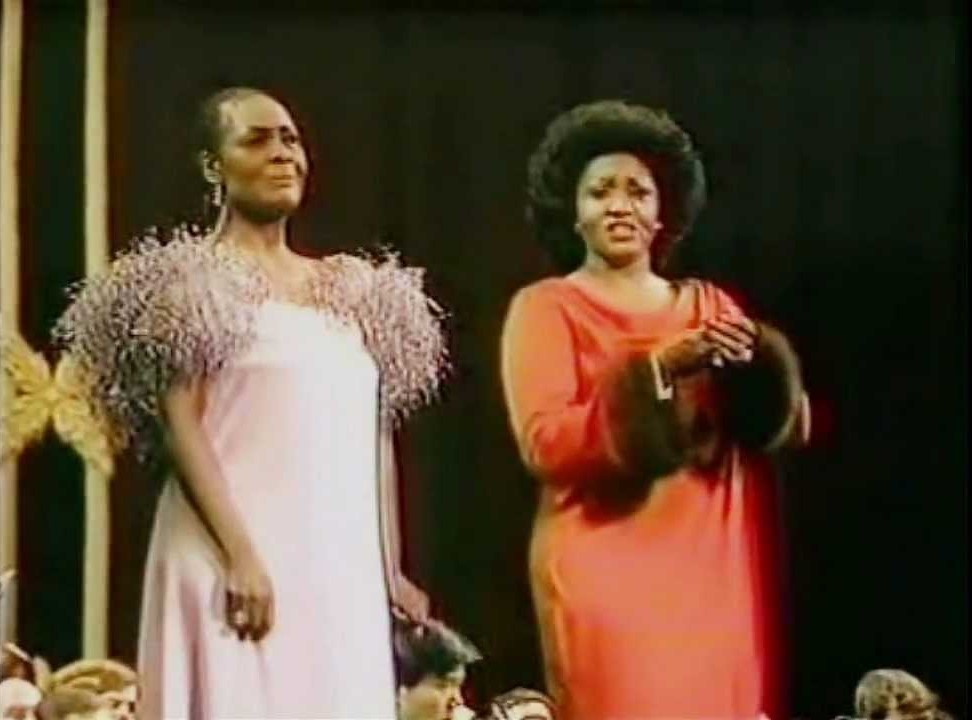
A still from the 1984 telecast recorded at Covent Garden, 4 December 1983.
Hector Berlioz: Je vais mourir (Les Troyens). From a live 1969 Rome concert performance of the abridged opera. The Orchestra Sinfonica e Coro di Roma della RAI is conducted by Georges Prêtre. Others in the cast include Nicolai Gedda, Marilyn Horne, Robert Massard, and Veriano Luchetti. Shirley Verrett, along with Régine Crespin and Janet Baker (even singing the role in English!) was one of the all-time supreme interpreters of Didon. See below for more links to live excerpts.
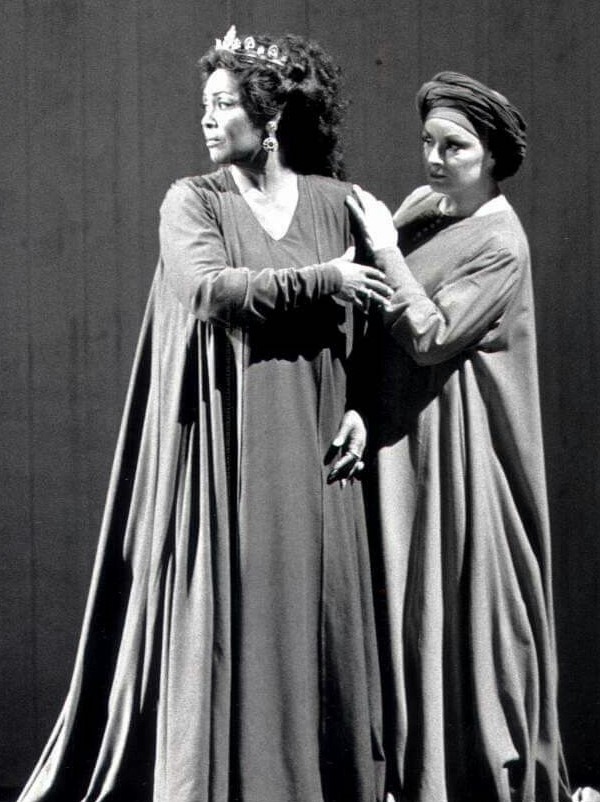
in the 1990 inaugural production of Les Troyens at the Opéra Bastille.
Cole Porter: I Love Paris. This is a very brief clip from a short about Shirley Verrett’s years in Paris. This was evidently telecast on Paris Première, a cable channel which debuted in 1986. I have been unable to find out anything more substantial about this program. It is magnificent to hear Shirley toss off a few phrases of the iconic Cole Porter song. I only wish it were longer! It’s worth watching the entire clip to hear Verrett in fascinating video excerpts from many of the roles she sang in Paris.
Incidentally, I just found this wonderful program from France Musique that commemorates Verrett, which features a number of rare live recordings, as well as excerpts from some of her best recordings. Enjoy!
Christoph Willibald Gluck: Non cet affreux devoir… Je t’implore et je tremble (Iphigénie en Tauride). Live 1985 performance (possibly 16 October), Opéra de Paris (Palais Garnier). Though it is not easy to find complete information about this performance, I believe it was conducted by Kenneth Montgomery on the date cited above. This is possibly one of Verrett’s most successful late career assumptions, though the voice sounds a little shrill and driven, possibly because of the low fidelity of the recording. Nevertheless, the electricity she generates is palpable.
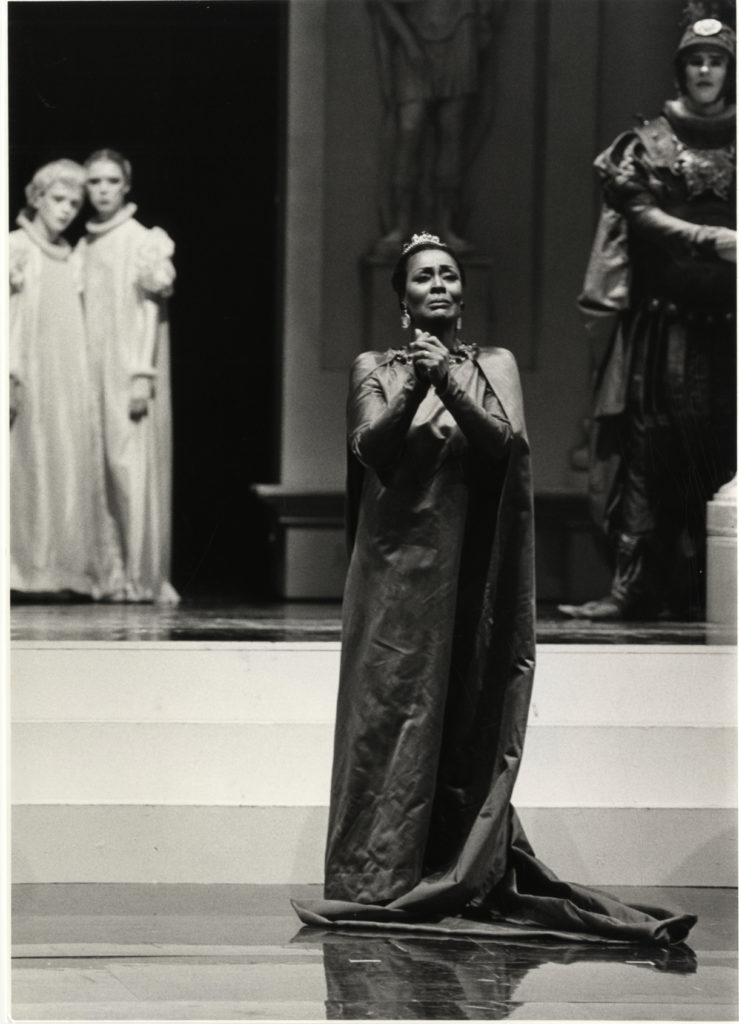
of Iphigénie en Tauride, Opéra Bastille 1985. Photo by Daniel Cande, Gallica/Bnf.fr.
Christoph Willibald Gluck: Divinités du Styx (Alceste). Live 1985 dress rehearsal, Opéra de Paris (Palais Garnier). A few things are remarkable about this performance. First of all, the production was directed by Robert Wilson, whose work with Jessye Norman was discussed in last week’s episode. Verrett finds a wonderful balance between his stylized postures and her natural tendency to give to the nth degress. Second, it is a dress rehearsal and in certain aspects Verrett can be heard holding back slightly vocally. And yet her powerful high notes are completely on point. (The photos below of that production, as with the Iphigénie photo above, are by Daniel Cande, Gallica/Bnf.fr.)
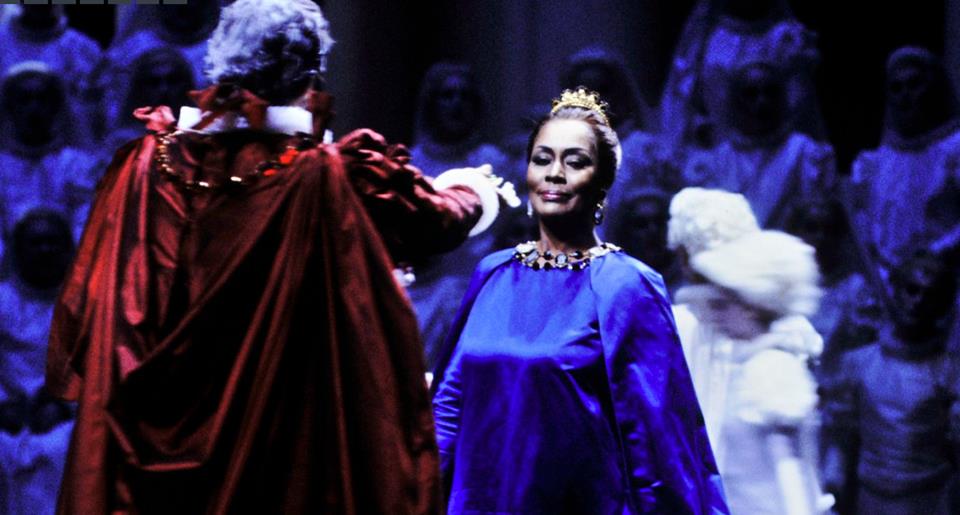
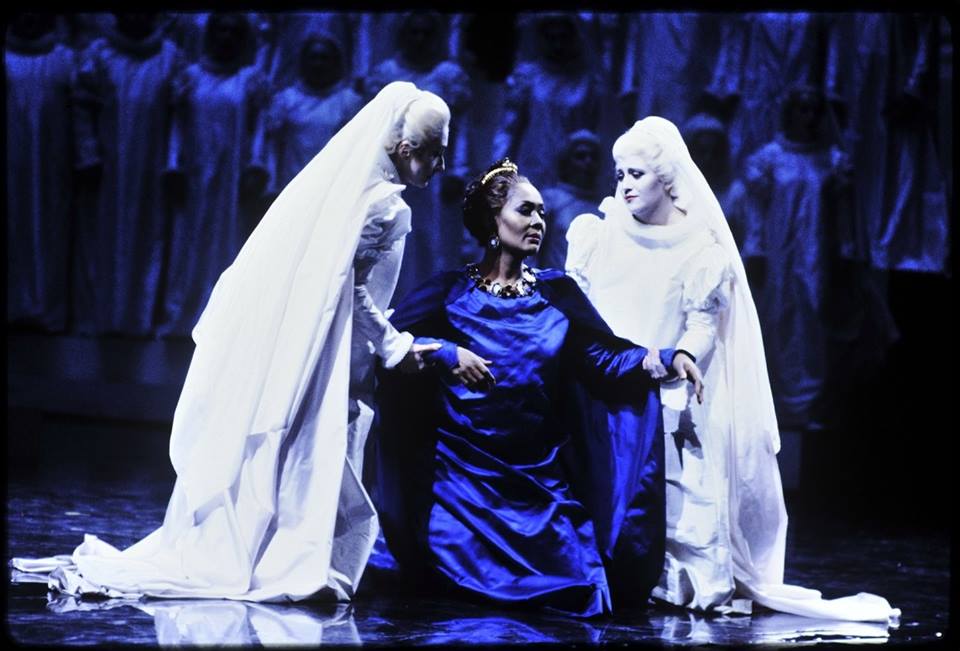
Giacomo Meyerbeer: Sur mes genoux (L’Africaine). Live recording from San Francisco Opera, 3 November 1973. Jean Perisson, conductor; the cast includes Evelyn Mandac and Simon Estes. The role of Selika was a perfect fit for Shirley Verrett, yet she only sang it twice, both times in San Francisco, once in 1973 and again 16 years later, this time filmed for telecast, both times with a tenor who shall remain nameless.
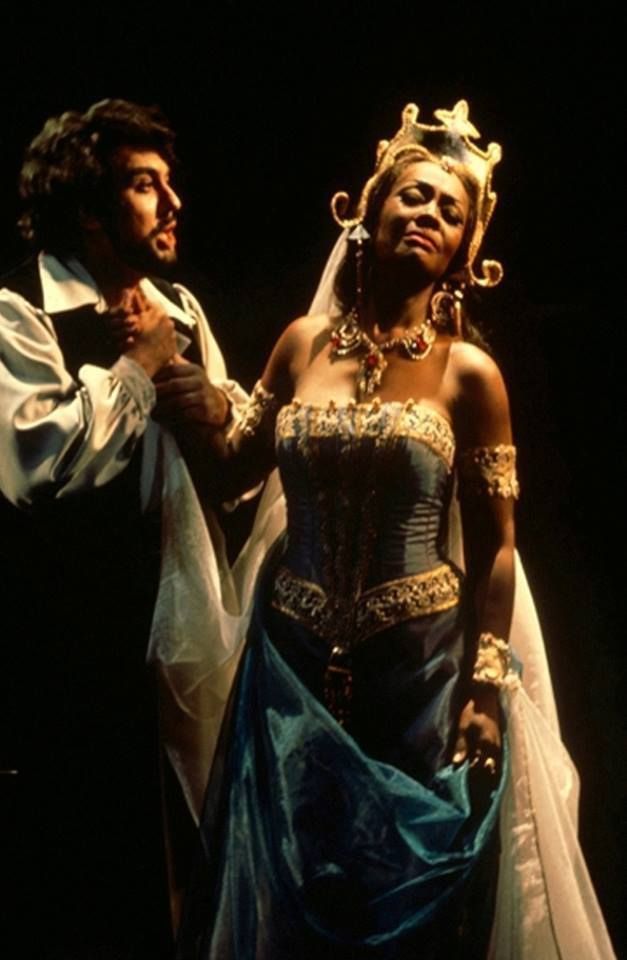
to be saying “Get away from me!”, most of us can sympathize with her reaction!
Georges Bizet: Final Scene (Carmen). Live performance from the Royal Opera House, Covent Garden, 4 July 1973. Georg Solti conducts a cast that includes Kiri Te Kanawa, José van Dam, and Thomas Allen. As mentioned on the podcast, the role of Carmen provided Verrett with some of her most important debuts, including at the Bolshoi in 1963 and at the Metropolitan Opera in 1968. Though eventually she dropped the role from her repertoire, she gives a pitch-perfect performance of the role in this live performance from 1973. The story is that she was also supposed to record the role for London/Decca but had to withdraw from the recording and was replaced by the magnificent Tatiana Troyanos, who gave a complete different but equally valid interpretation of the role. Meanwhile, we are very lucky to have this 1973 live performance in excellent sound from Covent Garden.
Camille Saint-Saëns : Two excerpts from Samson et Dalila. The first, Amour, viens aider ma faiblesse is from a September 1980 performance at the San Francisco Opera conducted by Julius Rudel with a cast including Wolfgang Brendel, Arnold Voketaitis, and Kevin Langan. As in the past several examples, the tenor is a defamed sexual harrasser who shall remain nameless. The second example, Mon cœur s’ouvre à ta voix. is from a Covent Garden production on 6 October in the same year directed by Elijah Moshinsky. Here Verrett’s conductor is Colin Davis and her Samson is Jon Vickers, a brilliant actor and singer whose reputation is somewhat tarnished by his ingrained homophobia, but unlike the previously mentioned defamed tenor, is a genuinely great artist. Please note: this is the performance that I cite on the podcast as providing a stunning example of Verrett’s greatness and subtlety as an actor. Don’t miss this!
Cornélie Falcon. The shortest influential career in operatic history?
I had intended to write a long introduction to the important French singer Marie-Cornélie Falcon (1814-1897), who created, among other roles, Rachel in Fromental Halévy’s La Juive, Valentine in Giacomo Meyerbeer’s Les Huguenots, and, interestingly, Pamira in Gioacchino Rossini’s Le siège de Corinthe (the role, interestingly, which Beverly Sills sang at her belated 1975 Met debut opposite Shirley Verrett’s assumption of the pants role of Neocle in the curious Italian hybrid version of the opera called L’assedio di Corinto). Falcon’s career ended after only five years when, at the age of 23, she lost her voice during a performance of the role of Léonor in Louis Niedermeyer’s Stradella. (Certainly an opera and a composer lost somewhere along the side of the road in operatic history!) For one whose career lasted such a short time, Falcon definitely created a lasting impact, even lending her name to a new (if infrequently used) voice category, the falcon.
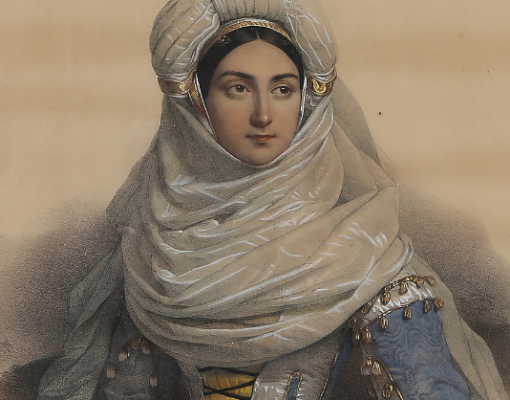
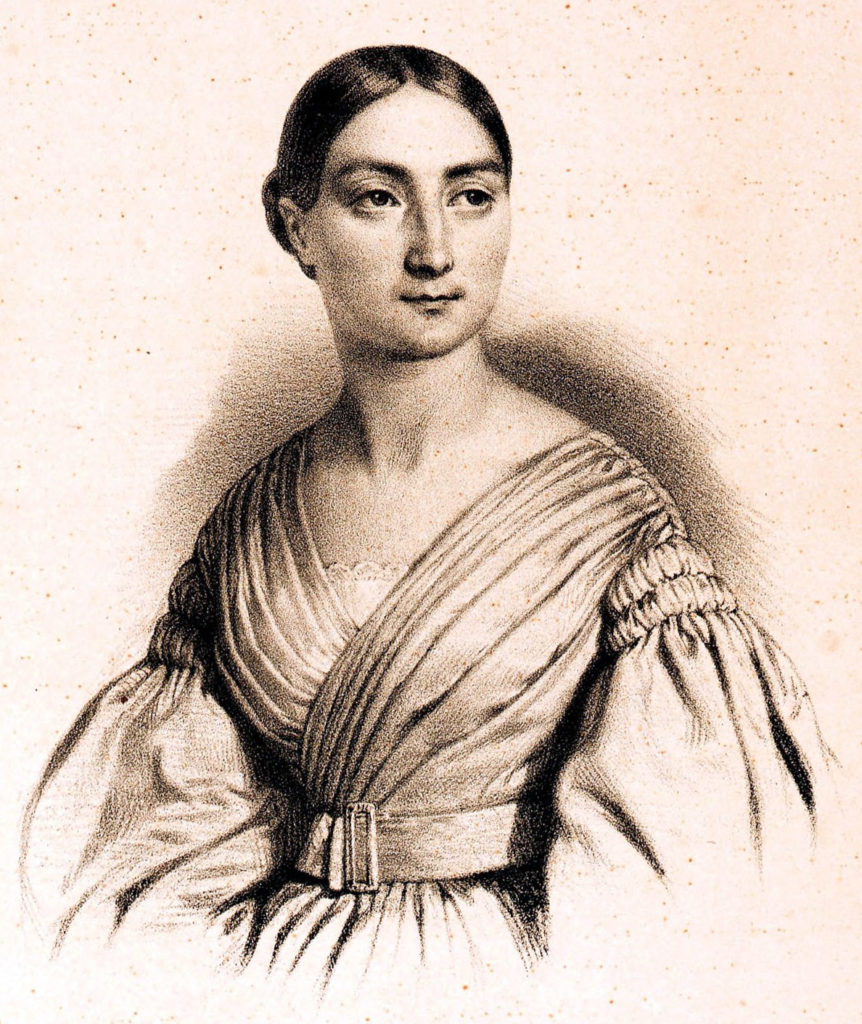
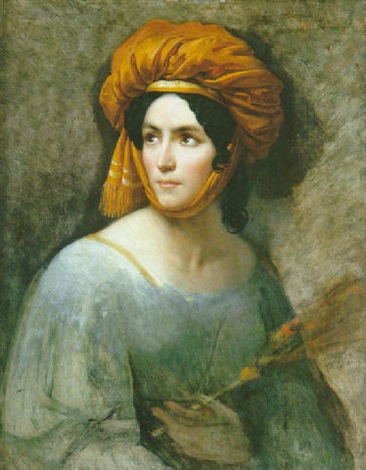
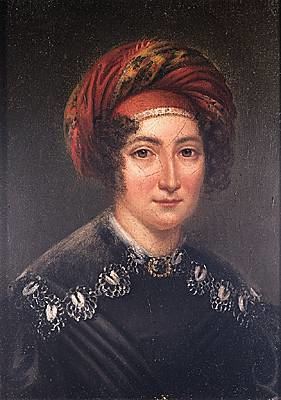
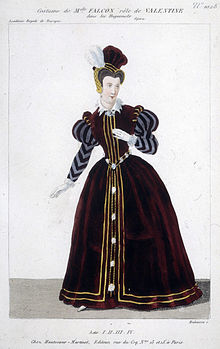
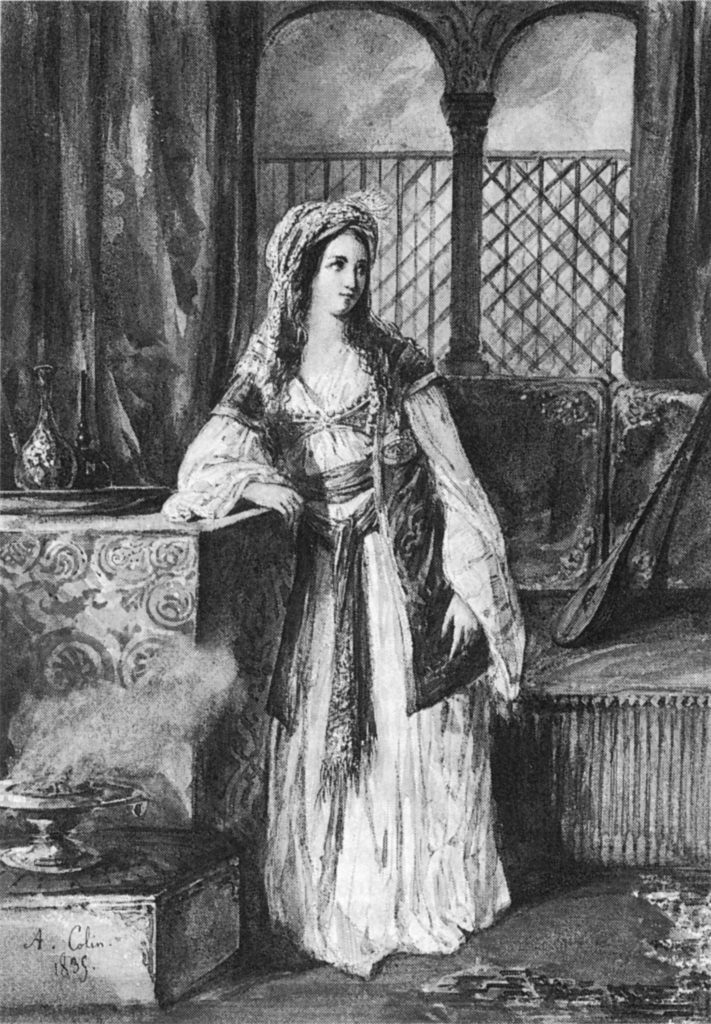

Modern-day falcons.
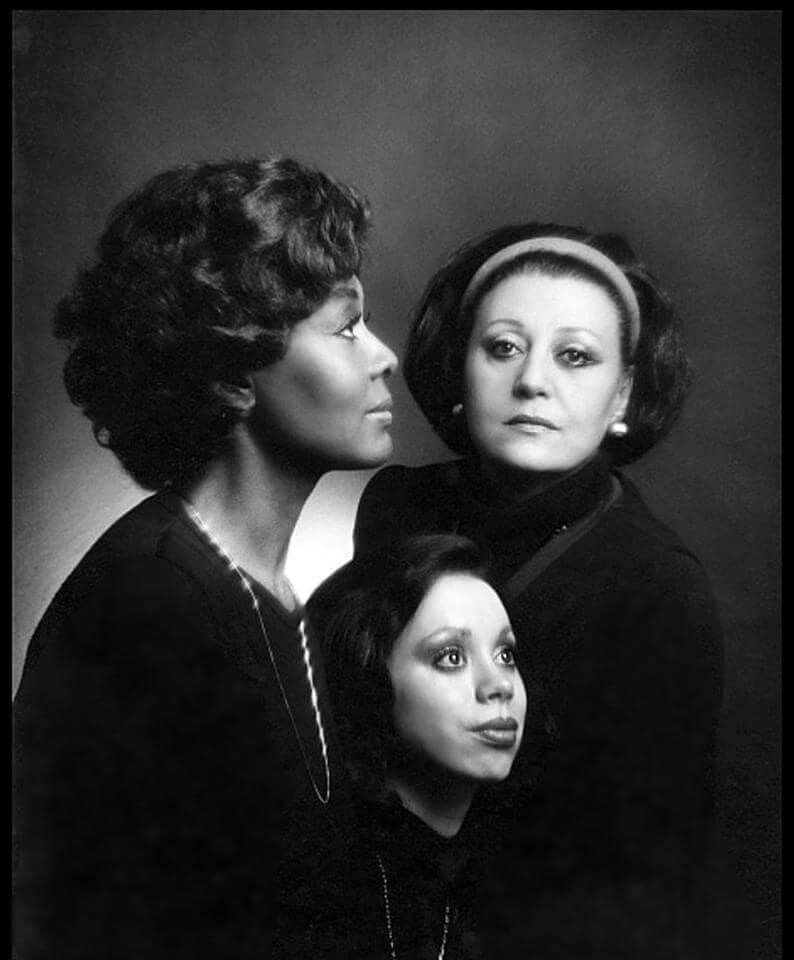
in this beautifully-composed shot by Jack Mitchell taken at the time
of the 1977 Metropolitan Opera premiere of The Dialogues of the Carmelites.
Some of the most interesting (and occasionally controversial) singers in the recent past could be considered falcons, among them Régine Crespin, Grace Bumbry, Jessye Norman, Maria Ewing, Anna Caterina Antonacci, Lorraine Hunt Lieberson, and Christa Ludwig. One could even make the case for Maria Callas as a potential falcon, if her career had remained active in the early 1960s and she had taken on more French and zwischenfach repertoire.
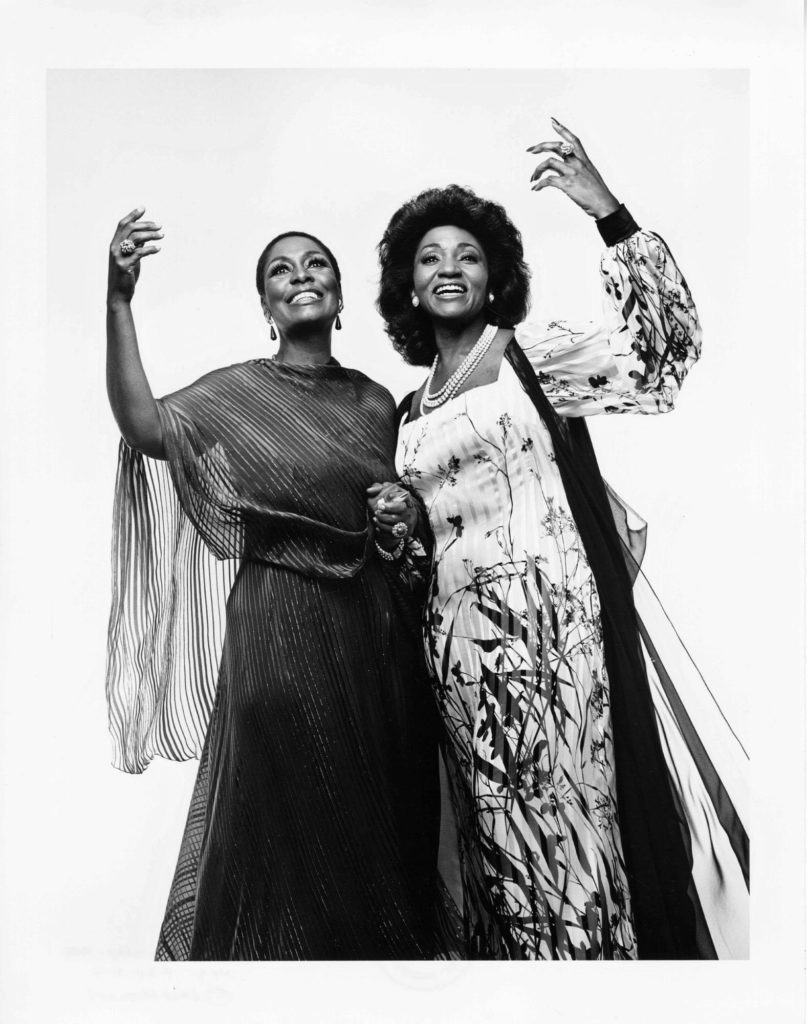
How about this? I promise to whatever few people actually visit this page, to bring you a more thorough discussion of the purveyors of the so-called falcon fach (heavens, what a linguistic mash-up that is!) and the roles that they sing in the second installment of La Nera Callas in two weeks. In anticipation, enjoy these marvelous photos below of some of the prime falcons in recent operatic history.
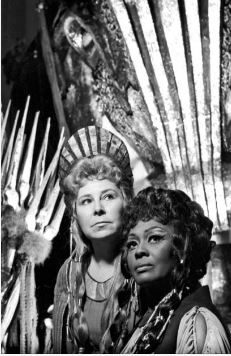
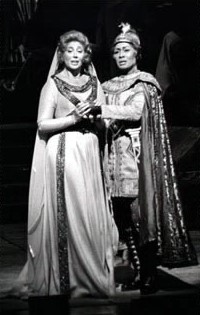
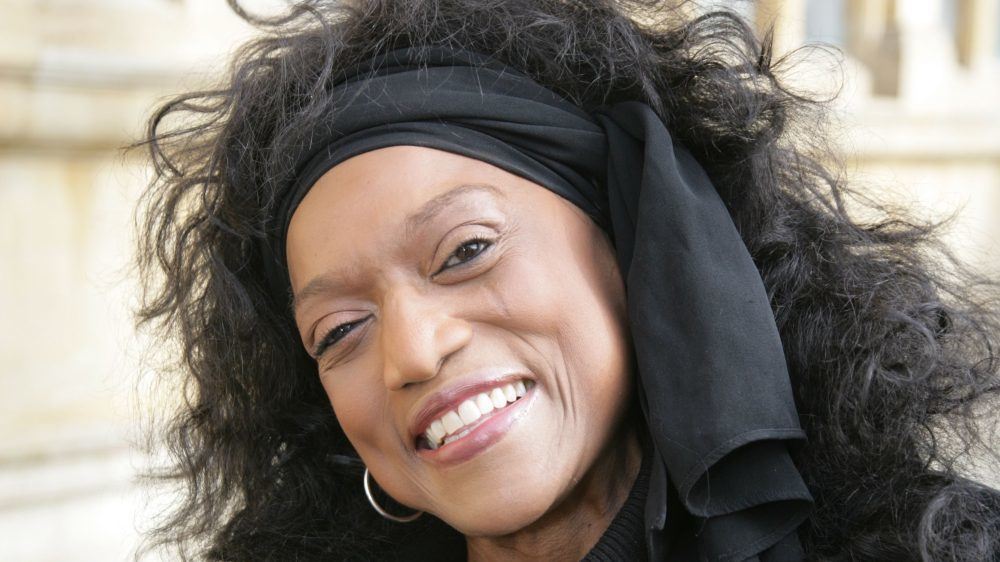
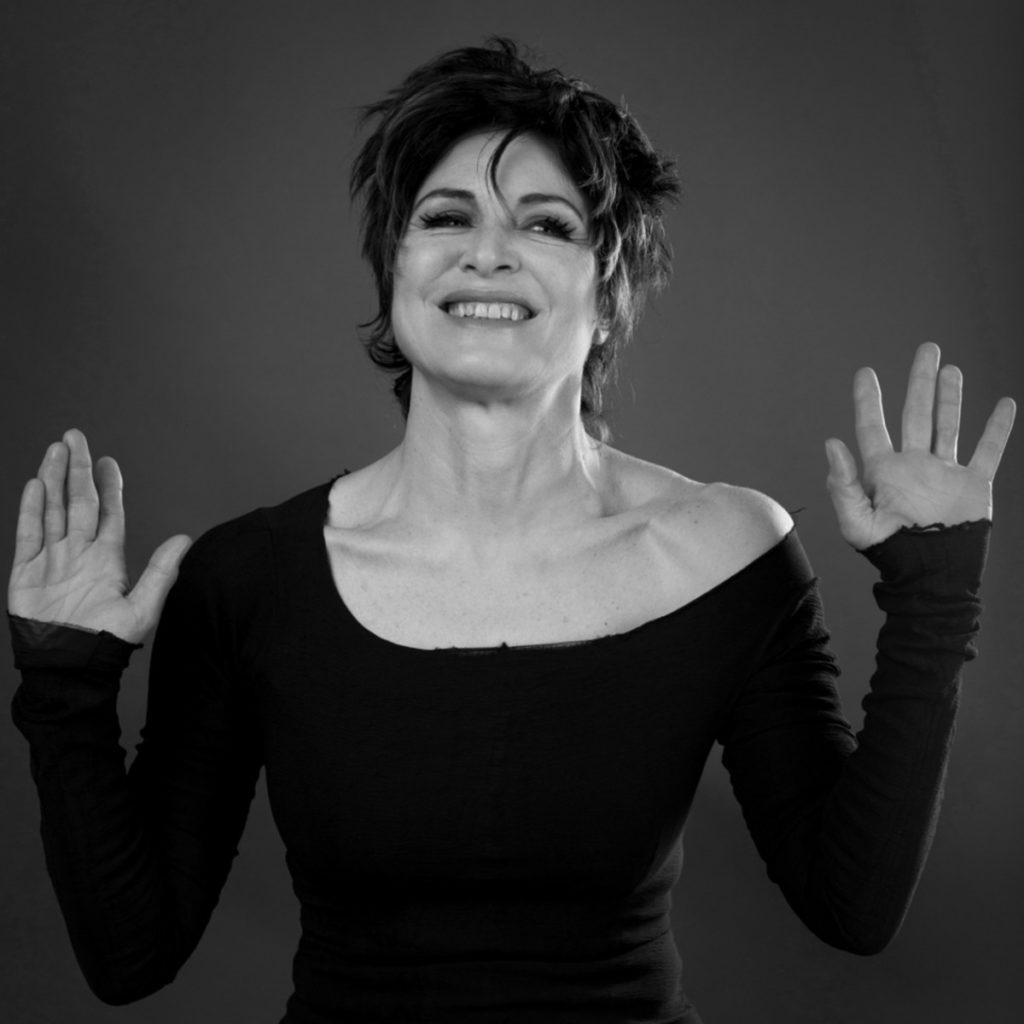
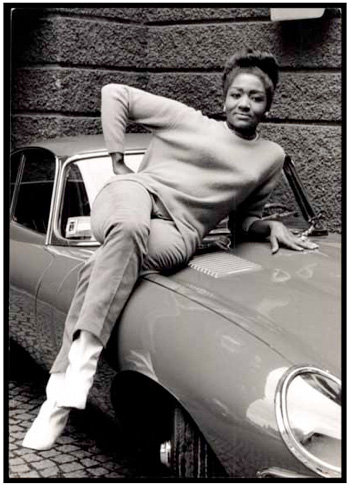
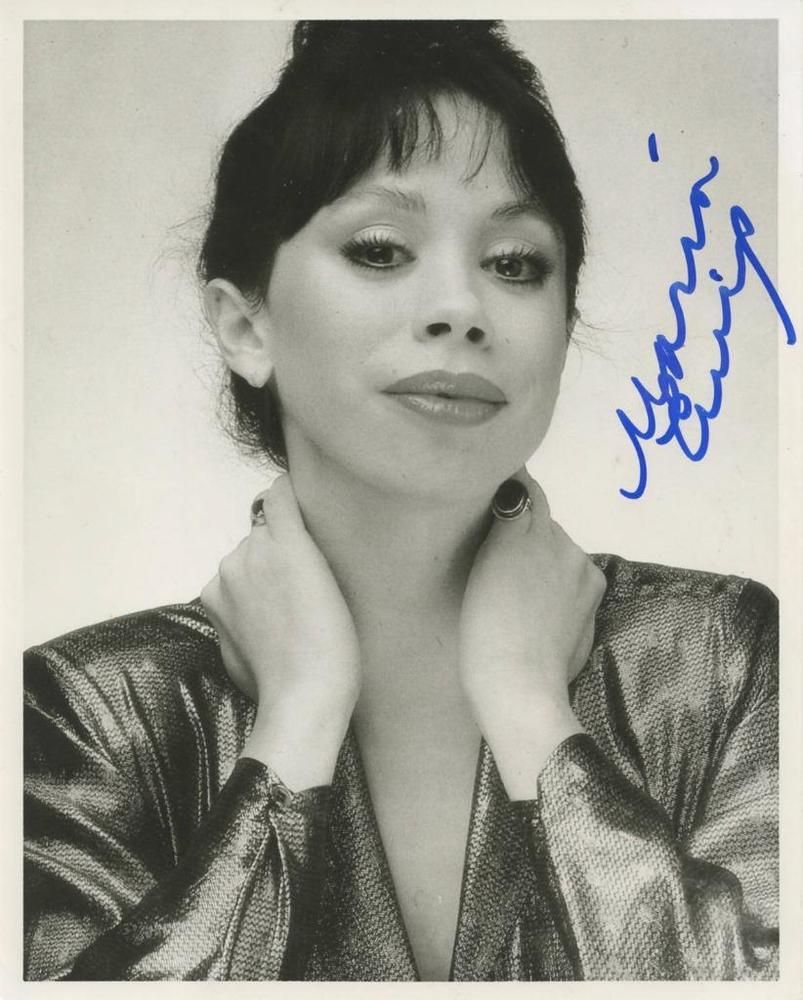
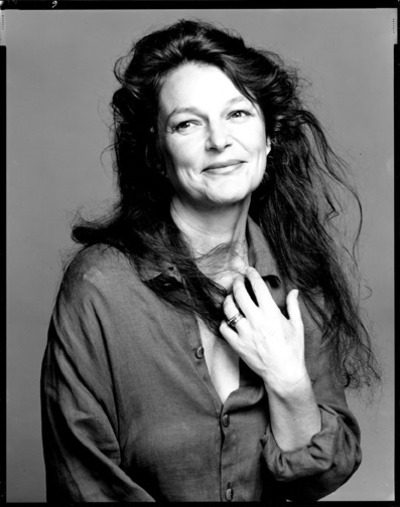
Additional listening
I have given myself ONE ADDITIONAL HOUR to work on this Show Notes page today. In that time, I want to present you with as many YouTube clips as possible of today’s subject.
I want to pay particular tribute to the YouTube user foropera, who has done opera lovers the enormous service of posting rare clips, both audio and video, of Mme. Verrett. S/he tends to post only short snippets, which can sometimes be a little irritating when one wants to hear full arias or movements, but in spite of that, we are much in this poster’s debt.
Shirley Verrett singing Brahms
This is a fascinating relic from Shirley Verrett’s student days at Juilliard: two 1957 performances of the Brahms Vier ernste Gesänge, both with pianist Marius Nygaard. One can hear even in this very early clip, Verrett’s intense connection with Brahms’s music. In the follow-up episode in two weeks, I will also feature more of Shirley’s work in recital.
Shirley Verrett as Eboli in Don Carlo
Here is the complete performance of the opera from the Wiener Staatsoper in 1970 referenced above featuring Horst Stein conducting a cast including Corelli, Janowitz, Ghiaurov, Talvela, and Blegen (appropriately, as the Heavenly Voice). Astoundingly, this production marked Shirley Verrett’s sole appearances at the Wiener Staatsoper!
Shirley Verrett as Azucena in Il Trovatore
Here is a complete performance from the San Francisco Opera (opening night of the 1975-76 season, 17 September 1975, featuring Richard Bonynge conducting a cast including Luciano Pavarotti, Joan Sutherland, Ingvar Wixell, and Clifford Grant.
Incidentally, here are the other live video clips from the legendary 1976 Met Trovatore featuring Pavarotti, Scotto, and Quilico, with Gianadrea Gavazzeni conducting.
- The Act Two scene between Manrico (Pavarotti) and Azucena (Verrett) which includes the hair-raising Condotta ell’era in ceppi and the subsequent duet.
- The Act Two scene which includes Louis Quilico as di Luna singing Il balen del suo sorriso and Renata Scotto as Leonora singing D’amor sull’ali rosee.
- Renata Scotto singing the Miserere and the often-cut cabaletta Tu vedrai che amore in terra. (If you love Scotto, ya GOTTA watch this one!)
- Pavarotti and Verrett singing Ai nostri monti, a short but tender excerpt from the final scene.
In addition, here is the audio of a complete performance from that run, this time with Matteo Manueguerra as di Luna.
Shirley Verrett in Un ballo in maschera
- As Amelia. The complete 30 December 1977 performance from La Scala excerpted in the podcast featuring Claudio Abbado conducting a cast including Luciano Pavarotti, Piero Cappuccilli, Elena Obraztsova, Daniela Mazzucato. The Act II duet with Pavarotti is a particular highlight.
- As Ulrica. Verrett made her Covent Garden debut in 1966 in this role. This live excerpt from the 14 May 1966 performance of the Act II trio, Che v’agita così?, is conducted by the great István Kertész, and also features Jon Vickers as Riccardo and the superb British dramatic soprano Amy Shuard as Amelia.
Shirley Verrett as Desdemona in Otello
Ms. Verrett sang staged performances of this role exclusively in Boston in 1981. Here is a live recording of the Willow Song and the Ave Maria. She also sang the same excerpt in the second half of the duo concerts with Grace Bumbry around the same time. In addition, I have a clip of Verrett and James McCracken singing the emotionally violent Act III duet from the same Boston performances. As always, Sarah Caldwell conducted.
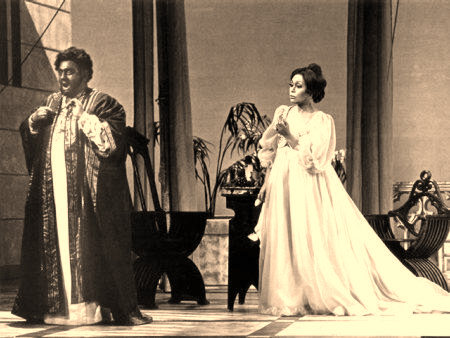
in the 1981 production of Otello at the Opera Company of Boston.
Shirley Verrett as Floria Tosca
- A bad-looking transfer of Met telecast of the Act I duet with Pavarotti.
- The complete Act II from the 1980 performance referenced above, with Seiji Ozawa conducting a cast including Sherrill Milnes and Veriano Luchetti.
- The beginning of Act III from the 1978 Met telecast (unfortunately without any Shirley!), including E lucevan le stelle.
- A performance of the Act III duet in not-terrific sound from a performance in Verona on 2 July 1984 with Giacomo (Jaime) Aragall and Daniel Oren conducting. Shirley is not in great voice here, but in spite of that, her “Io quella lama” line makes its mark.
Shirley Verrett in Aida
- In the title role, live performance 8 August 1980 from Boston with a cast including James McCracken as Radames, Elizabeth Connell as Amneris, David Arnold as Amonasro and Ferruccio Furlanetto as Ramfis. Sarah Caldwell conducts the forces of the Boston Opera Company. foropera has provided us with this fascinating, if dimly-recorded, audio of Verrett’s assumption of the title role of Aida. She is in full command of nearly every aspect of the role.
- As Ameneris. By contrast here is Verrett at her considerable best as Amneris in a 1971 BBC television program which pitted her against the Radames of Richard Cassilly. The clip includes the subsequent judgment scene and is something to see and hear!
Shirley Verrett in Les Troyens
- The love duet, Nuit d’ivresse from the 1969 Rome performance conducted by Georges Prêtre and featuring Nicolai Gedda as Énée .
- The same scene from the 1973 Metropolitan Opera production and featuring Jon Vickers as Énée to Verrett’s Didon. Rafael Kubelik, beginning his very brief tenure as the Met’s music director, conducts; I feel that his more relaxed tempo better suits the music.
- Two excerpts from the above performance featuring Shirley Verrett as Cassandre. Les grecs ont disparu… Malheureux roi. and Tous ne périront pas. This is the role which she was originally slated to perform in the same production before she jumped in to cover for Christa Ludwig as Didon. Though she sang that latter role more frequently, one can hear just how well Verrett’s artistry suits her in the role of Cassandre as well.
- Didon’s death scene from a 1978 Ravinia performance of Les troyens also featuring Claudine Carson as Anna, James Levine conducting.
Shirley Verrett singing Gluck
- Several excerpts from the 1985 dress rehearsal of the Robert Wilson production of Alceste referenced above, also featuring Barry McCauley as Admète. One can hear here just how well-suited Verrett was to the high-lying aspects of this zwischenfach role.
- Again from Alceste, Verrett singing Divinités du Styx from a 1989 gala celebrating the opening of the Opéra Bastille. By all accounts she was apparently quite nervous here, but in spite of that, she still creates an intense impact.
- O toi, qui prolongeas mes jours from Iphigénie en Tauride. Once again, noble, intense, and exquisite.
- Finally, foropera has put together a clip of Verrett singing snippets of singing Gluck excerpts, including the title roles of Orfeo in Orfeo ed Euridice (which she also recorded complete for RCA Victor earlier in her career), Alceste, and Iphigénie en Tauride. Based on the extant material, Alceste remains my favorite of her Gluck assumptions.
Shirley Verrett singing Sélika in Meyerbeer’s L’africaine
- The complete legendary 1973 San Francisco Opera production excerpted in the podcast and referenced above. Jean Périsson conducts.
- An excerpt from the 1989 San Francisco Opera telecast featuring Justino Díaz as Nélusko. Maurizio Arena conducts. These were Verrett’s final appearances with the San Francisco Opera.
Shirley Verrett as Carmen
In a 1977 interview following her performances of the Liebestod from Tristan und Isolde with the New York Philharmonic, Shirley Verrett claimed that she had abandoned the role of Carmen. However, in 1984 she once again appeared in the part, at La Scala with Claudio Abbado conducting a cast that included Ruggiero Raimondi and Alida Ferrarini. Happily for us, the 7 December 1984 performance was telecast and is available on YouTube.
Shirley Verrett as Dalila
- Once again at La Scala, Shirley Verrett performs the role of Dalila in a live performance from 25 January 1970 conducted by Georges Prêtre; the cast included Richard Cassilly and Robert Massard. First, Printemps qui commence, followed by Amour, viens aider ma faiblesse and Mon cœur s’ouvre à ta voix (with passionate interjections by Cassilly’s Samson).
- From the 1981 San Francisco Opera performances with that unnamed hot-blooded sexually aggressive tenor, Act II of the opera as conducted by Julius Rudel.
- To complement the Covent Garden performance of Mon cœur s’ouvre à ta voix from the same year, here is Verrett singing, once again, Amour, viens aider ma faiblesse.
Shirley Verrett: Fan appreciations
In closing, because Shirley Verrett was greeted by frequent backlashes based on her musical, vocal, and artistic choices (here is a choice one) two frankly adoring fan posts touting the many virtues of Shirley Verrett. One, written by user Enzo Bordello, appeared on parterre.com, and the other, on the Oberon’s Grove blog.
I will be back in two weeks to discuss further Verrett’s two greatest achievements, as well as her recital work, and her recordings of pop music and spirituals. Meanwhile, please tune in next week for the first part of my interview with Janet Williams.
